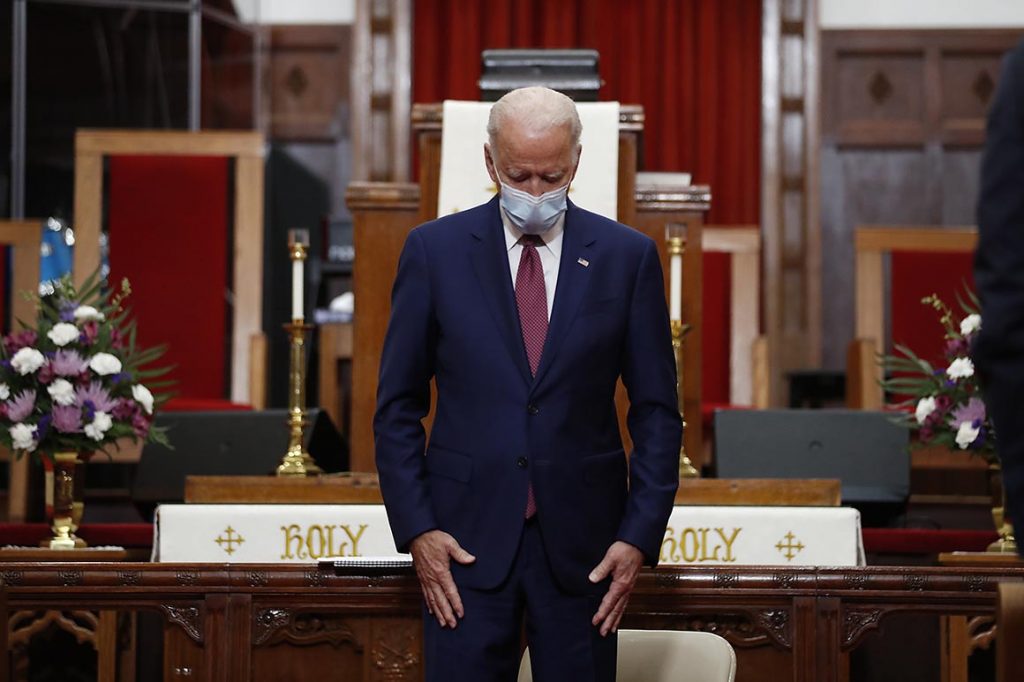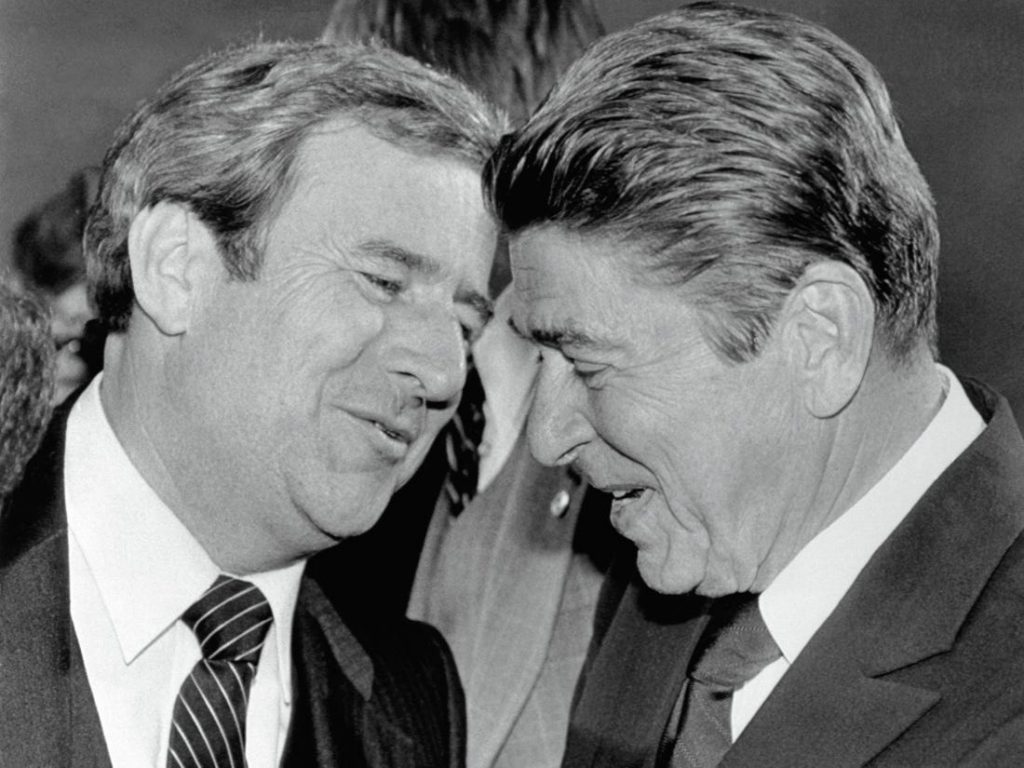A strange air of normality returned to American politics last Saturday in Wilmington, Delaware: Joe Biden went to Mass.
The “protective pool” of reporters whose job it is to shadow the president-elect wherever he goes complained that Biden’s staff hadn’t given them an adequate heads up as to the late Saturday afternoon movements of the next president of the United States. An Associated Press reporter actually complained on Twitter that the whole business was “unacceptable,” since the American people have a right to know about all activities of the president-elect.
On the one hand, I agree. On the other hand, given the chaos of Donald Trump’s refusal to accept defeat not to mention his four shambolic and corrupting years, how quaint that reporters were complaining that they didn’t have adequate notice that Joe Biden was, wait for it – going to Saturday Mass.
Biden will be, of course, only the second Catholic president and it should be obvious to even the most casual observer of his political and personal life that his faith is very much at the center of who he is.
“I’m as much a cultural Catholic as I am a theological Catholic,” Biden wrote in his 2007 memoir. “My idea of self, of family, of community, of the wider world comes straight from my religion. It’s not so much the Bible, the beatitudes, the Ten Commandments, the sacraments, or the prayers I learned. It’s the culture.”
In that same book Biden wrote, as many Catholics will recognize, about the cultural traditions of the church. “My attendance was not optional,” Biden said of his childhood as an Irish-Catholic kid. “The entire Finnegan clan (Biden’s mother’s family) rode over to Saint Paul’s Catholic Church together, and the church felt like an extension of home.”
As an adult convert to the faith, I had none of Biden’s childhood immersion in the ways of the Catholic Church, but like him – and like many fellow Catholics I suspect – I was drawn to the church’s message of social justice.
In an article in The Christian Post just before the election Biden wrote: “My Catholic faith drilled into me a core truth – that every person on earth is equal in rights and dignity, because we are all beloved children of God. We are all created ‘imago Dei’ – beautifully, uniquely, in the image of God, with inherent worth. It is the same creed that is at the core of our American experiment and written into our founding documents – that we are all created equal and endowed by our creator with inalienable rights.”

Donald Trump won election in 2016, in part, on the strength of his support from Catholic voters and evangelical Christians. He failed to win re-election in 2020, in part, because significant numbers of those voters rejected him. Trump still won large majorities among evangelicals, but where Hillary Clinton won 14 percent of Michigan evangelicals in 2016, Biden won 29 percent of those voters this year. Biden tripled Clinton’s share of the white evangelical vote in Georgia. One could argue that these voters elected him president.
Perhaps, just perhaps, some of these voters realized they were taken in by a thrice married reality television performer who promised to protect religious freedom but ended up trashing basic Christian values: vilifying Muslims, separating refugee children from their parents and not knowing Corinthians from Colonel Sanders. Maybe some of them realized walking the faith is a lot different than talking it.
When Jimmy Carter, a born-again Southern Baptist who still teaches Sunday school and builds houses for people who need them, was elected president in 1976, the enjoyed wide support from evangelicals. Those same voters, some heavily influenced by a New Right social agenda articulated by a very conservative Catholic like Paul Weyrich and an extremely conservative Baptist like the Reverend Jerry Falwell, abandoned Carter for Ronald Reagan in 1980. In many ways, this evangelical pivot was opportunistic. Carter’s faith didn’t change, but conservative politics did after 1980 and many Christians went along for the ride.
In one famous incident, Falwell, whose son Jerry, Jr., a major Trump supporter, was recently forced to step down from heading the college his father founded amid allegations of, as one publication noted, “sexual games and self-dealing,” fabricated an elaborate story about Carter in 1980.
The senior Falwell, eager to buttress his position with the emerging New Right, “lied,” as Carter confided to his diary, about a private meeting that never happened between the two men in the Oval Office. Falwell told supporters that Carter told him he supported a homosexual agenda and was committed to having homosexuals on his White House staff. “I’ve never had a private meeting with him,” Carter said, “he’s never been in the Oval Office, and I’ve never had any conversation.” It was a calculated lie for purely political purposes.
Immediately after the 1980 election, then-Idaho Senator Frank Church confronted Falwell about the widespread claim in that year’s Senate election – Church lost to Republican Steve Symms – that the four-term, pro-life Democrat was “a baby killer.” Falwell denied – lied through his teeth more correctly – that his group and those affiliated with it had used such language. But anyone in Idaho at the time remembers the church parking lots leafleted with the vile smear. Religion and what passed for Christian values increasingly became just an ugly extension of politics.

Few Americans, even Trump supporters, can honestly deny that the current president profoundly coarsened our politics over the last four years; slinging insults, aggressively pitting one faction against another, appealing not to better angels, but to worst instincts. Joe Biden, his life defined by the personal loss he has suffered – the early death of his wife, a daughter and a son – and by his Catholic faith, offers America a reset.
“If we look to politics to find reasons to be offended, we’ll never come up empty-handed,” says Michael Wear, an evangelical who worked on faith-based initiatives in the Obama Administration. “But this is not only an unproductive way to think about politics, but a destructive one. People of faith should be at the very center of making our politics about the common good, about service. I hope we take that opportunity.”
Or put another way, you don’t have to embrace all of Joe Biden’s policies, but you may want to give his “equal in rights and dignity” approach a chance. It is, after all, the season of thanksgiving. Be thankful for a renewed commitment to decency.
I’m again able to grab a bit of optimism about the near-term American future, and I’m hoping even my fellow citizens who don’t like the outcome of the presidential election will think about the upside of a Mass going, cultural Catholic who easily quotes Ecclesiastes and carries his late son’s Rosary in his pocket moving into the White House in a few weeks.
—–0—–
Additional Reading:
Some additional Thanksgiving week reading…
‘Loser’: How a Lifelong Fear Bookended Trump’s Presidency
Dan Barry has an excellent piece on how the loser hates to be a loser.
“… the citizens have cast their ballots, baseless lawsuits alleging electoral fraud have been dismissed and states have certified the vote. Still, the loser of the 2020 presidential election continues to see crowds that the rest of the country does not.
“It ends as it began.”
Doughnuts or Donuts? Krispy Kreme or Dunkin’? All of the Above?
A deep dive – or is it a deep dunk – into doughnuts (or donuts).
“Doughnuts’ rise continued through the 1930s. In 1934, the same year Clark Gable started dunkin’ up a storm on the silver screen, they were named the ‘Hit Food of the Century of Progress’ at the World’s Fair in Chicago. Even more monumentally, that year 19-year-old Vernon Rudolph opened the very first Krispy Kreme Doughnut Company store in Nashville, Tennessee, with his uncle Ishmael, who’d purchased a yeast doughnut recipe from a New Orleans chef with the whimsical name of Joe LeBeau.”
Make mine maple. Read the whole thing here.
Anthony Hopkins: “I wanted to be famous. I wanted to be rich”

Kyle Buchanan profiles the great actor Anthony Hopkins in The Irish Times and includes some gems.
“A chance encounter with actor Richard Burton, who had also grown up near Port Talbot and somehow became the toast of Hollywood, would help prod Hopkins toward performance. A gifted mimic, Hopkins saw plenty in Burton’s trajectory that he was desperate to emulate.
“I wanted to be famous. I wanted to be rich,” Hopkins says. “I wanted to be successful, to make up for what I thought was an empty past. And I became all of those things.”
Great actor, excellent profile.
Hope your Thanksgiving was all it could be in these crazy times. Thanks for reading. Be well.
